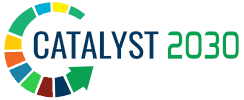Catalyst 2030 Team in Focus
Meet the Catalyst 2030 team, including members of the Secretariat and our valuable interns who support our movement with their skills, talents and enthusiasm.
This month we are focusing on our Systems Learning Team.

Systems Learning Facilitator
Debbi D. Brock
About Debbi
Debbi Brock is an internationally recognised authority on social entrepreneurship education and a trainer who focuses on social innovation, systems change and scaling social impact.
Debbi joined Catalyst 2030 as the Systems Learning Facilitator in 2021.
She has held multiple posts in higher education, most recently for nine years as an Associate Professor of Entrepreneurship at Wingate University. Previously, Debbi served as the Moore Professor of Entrepreneurship and Management and launched the Entrepreneurship for the Public Good (EPG) programme at Berea College in Kentucky. She is also the former Director of the Entrepreneurial Resource Lab at Miami University in Ohio.
Debbi was awarded the “Distinguished Service to the Field of Social Entrepreneurship Education” award by Ashoka University in 2011. She went on to launch the Social Change Innovators online portal to assist educators to connect and share resources on social entrepreneurship education. The portal has expanded its reach to include social entrepreneurs, governments and the private sector.
Debbi’s recent publications include Multi-Disciplinary Involvement in Social Entrepreneurship Education: A Uniquely Threaded Ecosystem and Using the Social Entrepreneurship Model to Teach Engineering Students How to Create Lasting Change. She won the best practitioner paper and best social entrepreneurship paper at the US Association for Small Business and Entrepreneurship (USASBE).
Q and A
What do you enjoy most about Catalyst 2030?
The people! Social Entrepreneurs are wonderful, having accomplished incredible impact both in your own local communities and globally – positively affecting the lives of others. There is not a week that goes by that we do not meet new social innovators that I had been teaching about for the last 20 years at university – now I am learning from them first hand. Addressing long term systemic challenges to address the SDGs is a tough challenge. By harnessing the collective knowledge of members and collaborating, we can co-create a new future that is more equitable and just.
Why is systems change work close to your heart?
I have spent my career focusing on social entrepreneurship education, understanding not only why systems have to be changed but how to accomplish long term systemic change. With so many societal problems that have been entrenched for years, the challenge is to identify systems level change needs – from structural or governmental policy changes, to shifts in relationships and power dynamics, ultimately influencing behavioural change to transform systems The need to engage key stakeholders to be actively involved in creating solutions and be willing to apply, test and learn from another will ensure that we confront the root causes and don’t just put a band-aid on the problem.
What is your dream job?
I have it! About two years ago when I was on the incubation board of Catalyst 2030, Jeroo asked me what I would love to do. In the one year, I had learned more on the board of Catalyst than I had in the ten years prior. My dream job was to work with Catalyst 2030! Having given up my tenured university position to work for what was basically a start-up was not a hard decision to make. Having a front seat view of the mobilisation of social entrepreneurs from all over the world has been a blessing.

Systems Learning Intern
Cherry Achando
About Cherry
Cherry is a skilled researcher with passion and interest in policy research, international relations and the political economy. She enjoys working in sustainable development and impact creation and values the concept of a circular economy. Cherry has experience in policy systems research that enables and/or inhibits economic development on the African continent. She also has experience working towards attaining sustainable development goals 3, 4 and 6 with the aim of alleviating the effects of poverty, working on climate change through the adoption of green hydrogen as an alternative source of energy and improving systems learning through her work at Catalyst 2030. In her spare time, Cherry enjoys reading, cross-pollinating and learning from experts in various fields.
Q and A
What do you enjoy most about Catalyst 2030?
I enjoy the spirit of sharing and generosity in Catalyst. Beyond being colleagues, the Catalyst 2030 team has been supportive of my personal growth. The opportunities at Catalyst challenge me to always put in my best efforts and the impact made by the organisation is immeasurable.
Why is systems change work close to your heart?
I am passionate about changemaking and hold systems change in high regard as I believe it is the starting point of changemaking. The realisation that what was done previously and how it was being done needs to transform to create real impact is what inspires my sentiments on systems change.
What is your dream job?
My dream job is working in the humanitarian space championing the inclusion of women and youth in decision-making and policymaking. I look forward to working on systems change for women and ensuring they are represented and accorded their human rights in different sectors. I would love to achieve this through working in international non-governmental organisations and pan-African institutions that work passionately towards ensuring gender equality is achieved, women’s rights are protected, and women are accorded fair and equal treatment in all aspects of life.

Systems Learning Intern
Karla Tijero
About Karla
Social justice and the diversity of issues that this field encompasses have long been Karla’s great passion. This passion has led her on a path where she has committed to work towards a more just society, both academically and professionally.
During her three-year tenure at the Gender Department at Lund University in Sweden Karla has read, written and researched migration, socio-economic inequalities and gender equality policy, working through theories such as intersectionality and postcolonialism with engagement in social movement and political issues.
She went on to join one of Sweden’s most established civil society organisations, Individual Människohjälp / Swedish Development Partner, first as an intern and later as a project leader. Here she gained experience working in gender equality and equal rights projects, to increase social and economic inclusion and participation, promote equal rights and opportunities and combat discrimination. Now one semester away from finishing her Master’s Degree in Human Rights and Humanitarian Action, with a focus on Project Management at Sciences Po Paris, Karla is looking forward to embarking on a new endeavour in her professional career.
Q and A
What do you enjoy most about Catalyst 2030?
The best part of working with Catalyst 2030 is being part of a growing movement of talented and motivated people from all around the world, who are committed and continuously seek to facilitate coordination and collaboration among each other. I particularly enjoy the way the network continuously shares best practices and learnings on a variety of issues related to the SDGs, to find better gateways to make system change happen.
Why is systems change work close to your heart?
It requires us to really approach different societal issues and inequalities with the understanding that we have to consider different societal structures, including all the interconnected factors that affect each other and the issue we are trying to tackle. Systems change work entails looking at patterns of behaviour and complexities and to think long term, which I believe is crucial if we are truly going to create the change we want to see in the world.
What is your dream job?
My dream job would be to continue to work on anti-discrimination issues and in the human rights field in an international context. I would love to be able to integrate a system change approach in my future work. I see myself working within a social enterprise organisation, an international NGO or an international organisation, in particular the OECD’s Observatory of Public Sector Innovation (OPSI).

Systems Learning Intern
Elin Walther
About Elin
Elin is one of the interns in the Systems Learning department at Catalyst 2030, where she contributes to the work being done towards achieving the SDGs, primarily through the organisation and running of the Learning Series events, working with academics from around the world. She is also involved in the planning for Catalyst Academy.
She received her Bachelor’s Degree in Development Studies at Lund University, where she majored in Human Geography and pursued an interest in research and writing about the potential of sustainable agriculture. Elin proceeded to continue with a Master’s Degree in Environmental Studies and Sustainability Science, also at Lund University. Her research focused on the Rights of Nature and the potential for combining environmental protection movements with the inclusion of indigenous and minority rights. She is a passionate researcher and student of everything regarding sustainability, inclusion and furthering the SDGs. Her most recent venture with Catalyst 2030 involves her assisting with the many research and learning opportunities provided through the Systems Learning projects.
Elin is based in Southern Sweden and beyond her professional interests, she is exceedingly passionate and involved in the training of her two rescue dogs, who take up most of her free time. She also enjoys reading, art, and cross-stitching and has an Etsy site where she sells her needlework creations.
Q and A
What do you enjoy most about Catalyst 2030?
The people, definitely! Working at Catalyst provides the opportunity to interact with a host of passionate, engaging, and incredible people within the Secretariat and its membership, as well as with others in the field who engage with us through events such as our Learning Series. Regardless of the project or topic, you have the chance to get to know these people socially and intellectually and to learn from their passions and experiences. That, to me, is one of the most valuable aspects of Catalyst 2030, and one that brings a lot of joy!
Why is systems change work close to your heart?
This is a question one could probably write an essay about with ease – but in short, it is an approach to development that goes beyond shallow, temporary solutions to issues and aims to create lasting and impactful long-term change. There are a lot of areas that are unfortunately systematically flawed, be it environmental protection, healthcare or human rights. Working in systems change and on the SDGs is a valuable way to contribute to improving the current state of things in the world. Learn what is wrong, why it went wrong, how we can improve it and work to co-create a better future. What could be more valuable than that?
What is your dream job?
I have always had a fairly open view of what to identify as my ‘dream job’. My dream job would be a job that brings me joy, in a field that I am passionate about and that lets me engage with like-minded people. Not to sound too “Systems Learning Team” but I think continuous learning is one of the most important and valuable things you can do for yourself. My dream job would be one where I can always keep learning from people around me. More practically, I love research and writing, engaging with people, organising events and partaking in peer learning experiences. Ultimately, my dream job would be doing enjoyable, valuable work that allows for my own personal development alongside like-minded people and hopefully contributing to help make the world a better place.
